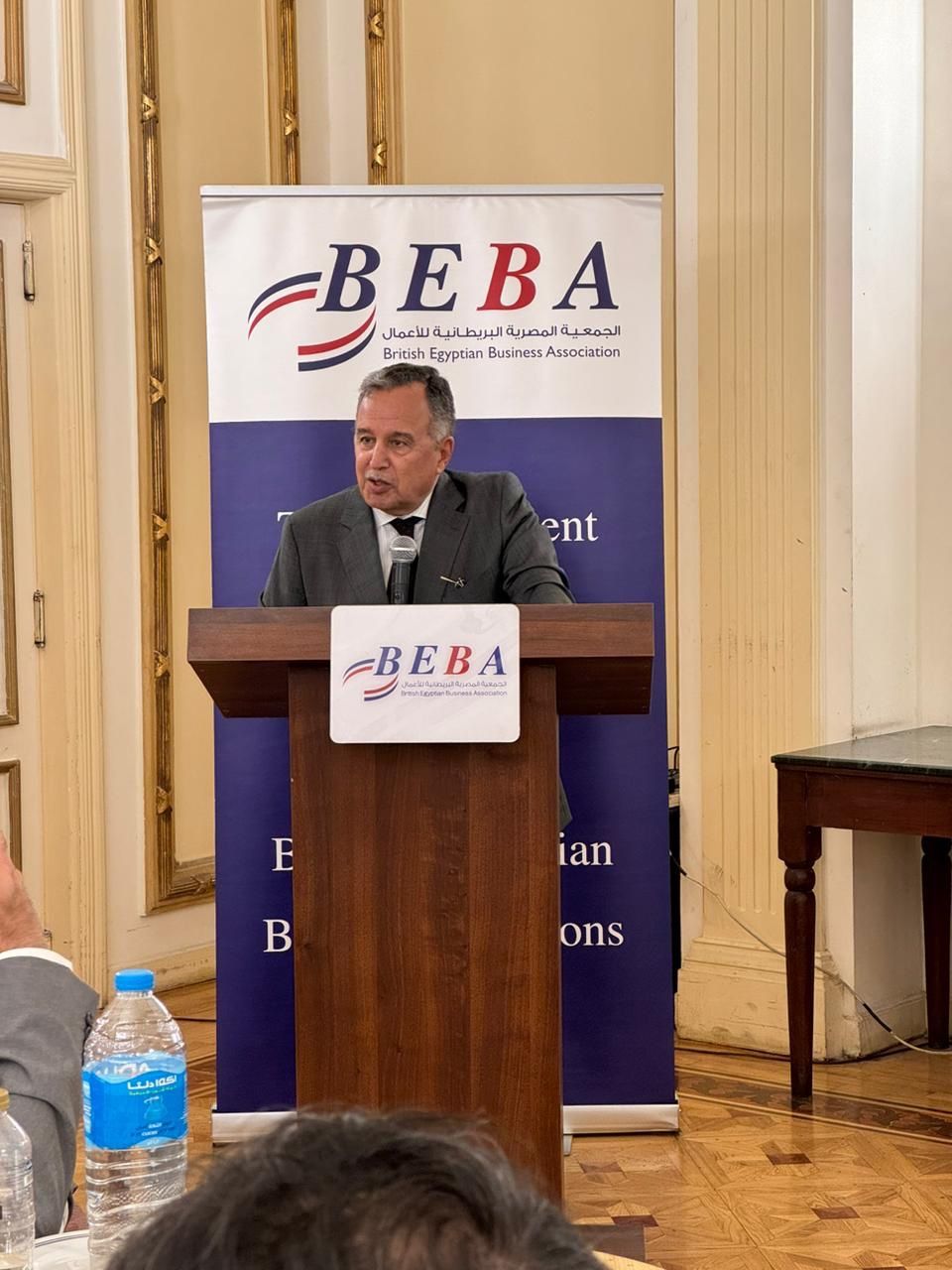BEBA hosts Nabil Fahmy on breakfast briefing

The British Egyptian Business Association (BEBA) has recently organised a breakfast briefing in honour of Nabil Fahmy, Chairman of LYNX Strategic Business Advisors and Former Egyptian Minister of Foreign Affairs, at Automobile and Touring Club of Egypt.
Themed “Our World Today: Where do we Stand in These Tumultuous Times,” the briefing was moderated by Karim Helal, President of Concord International Investment.
Among the esteemed guests attending the breakfast briefing were British Ambassador to Egypt Gareth Bayley; Singapore’s Ambassador to Egypt Dominic Goh; Akef El Maghraby, Chairman of Suez Canal Bank; and Abir Leheta, CEO of Egytrans.
H.E. Nabil Fahmy stated that humanity faces numerous challenges, and the Middle East is no exception. Issues like poverty, climate change, and regional conflicts demand international cooperation and isolation from these problems cannot be optional.
Egypt cannot isolate itself from the challenges haunting the neighbouring countries, he added, saying whenever there are security problems, insurance costs arise. Tracking the revenues of tourism and trade, Egypt has been impacted by the unfortunate, inhumane crisis in Gaza. That’s why Fahmy stressed the importance of the right management of resources and seeking collaboration to reach an action plan for the ongoing conflict in the region.
The future depends on the collective ability to address global challenges. There is need to embrace ethical principles and focus on long-term solutions, he elaborated.
Arab cooperation can be far more valuable than internal conflicts, Fahmy said, stressing that regional leaders must work together to build capacity and strengthen their societies.
Balance of Power
He further said that the traditional balance of power between superpowers seems to be shifting. While the United States remains a major player, other countries are gaining influence. This creates both opportunities and risks.
History reveals three common reasons for the decline of superpowers: overreach, unsustainable control costs, and unfair rule within their sphere of influence, Fahmy argued. This unfairness ultimately restricts the rights of people in these regions, leading to potential rebellion.

He said he does not believe in absolute power structures. They are inherently inefficient. While the United States currently holds the title of superpower, its future trajectory is uncertain. Questions remain about how long this dominance will last and the potential impacts of its future actions, he noted.
The emergence of a new single superpower would not be beneficial. It is akin to indulging in sweets readily, with consequences to face later. There is a necessity for a more balanced global order where countries actively participate and contribute, Fahmy explained.
The American electorate is undergoing a significant demographic shift. Latino Americans are the fastest-growing voting bloc. This transformation will have an impact on American politics in the coming years.
The US is currently navigating a period of societal change. Recent presidents, both young and old, have served only single terms. This suggests a nation searching for its future direction.
The United States continues to focus on China as a potential threat, neglecting internal issues surrounding technological advancement and communication. A focus on fostering international cooperation is critical for a sustainable future.
During a recent visit to Russia, Fahmy said he emphasised on the importance of building a strong relationship with the US – a partnership that benefits both nations. The goal is not to sway either country toward a specific agenda, but to create a more collaborative environment.
Rather than waiting for a change within the US, the world can encourage it by offering support and fostering self-reliance among other nations. This reinforces the notion of cooperation for mutual benefit.
Regional Challenges
The Middle East faces specific challenges, Fahmy stated, with the wealth inequality remaining a significant problem, despite globalisation. There is a necessity to focus on building capacity and fostering self-reliance within the region.
Arab countries can achieve more through cooperation than through internal conflicts. Building regional capacity will strengthen Egypt’s position on the global stage, he further said.
Refugees
Egypt has a long history of welcoming those in need, Fahmy stated, saying he does not prefer to categorise them as “refugees.” There is significant number of people from countries like Syria and South Sudan seeking refuge in Egypt, according to UN official statistics.
The situation in Rafah is concerning and source of great anguish, Fahmy said. If Israel forces the Egyptian government to intervene, a difficult situation will arise, he added. Egypt cannot shoot at people seeking refuge, but allowing unchecked passage weakens its position. Here, Israel’s actions seem intentional – aimed at undermining Palestinian identity and control, he noted.
Egypt needs collaborative solutions that address the needs of both refugees and host countries, and of course entails an immediate ceasefire.
A sustainable solution requires a collaborative effort from involved nations, not unilateral action or burden-shifting, Fahmy further said.
BRICS: Collab or More Resources
Speaking about Egypt’s joining the BRICS bloc, which includes Brazil, Russia, India, China, and South Africa, Fahmy said it represents an opportunity for increased collaboration rather than simply an economic resource. He views BRICS as a forum for dialogue and potentially a platform for more favourable trade terms with member nations. It is not a substitute for building strong domestic economies, he explained. While membership has its advantages, Egypt should not expect massive financial assistance as well. True progress will come through fostering trade and mutual understanding, he explained.
It is an opportunity, as Egypt can probably get more favourable terms in dealing with Russia, China, and India, he further elaborated.
Conclusion
Fahmy believes the future of global order can be shaped by cooperation, not dominance. By working together, the world can create a more peaceful and prosperous future for everyone.

